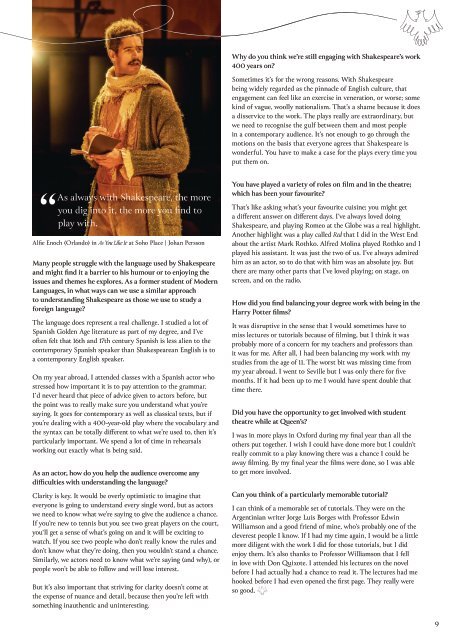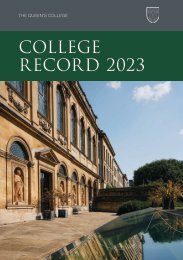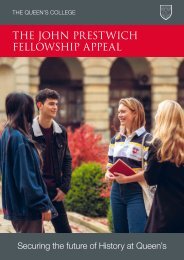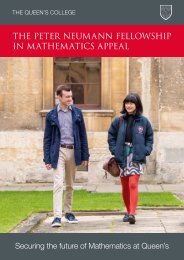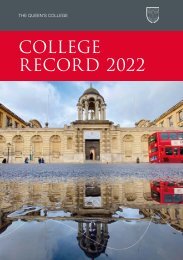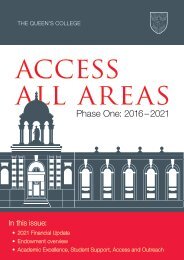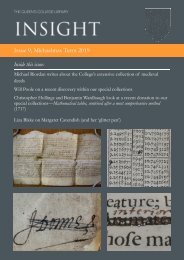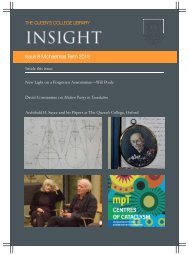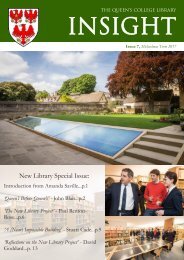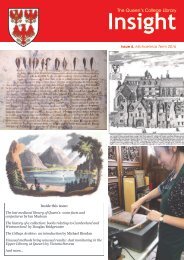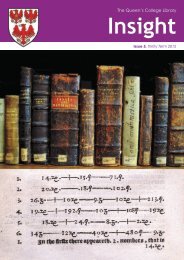Eagle Eye Magazine Issue 1 2023
Take a dive into the research and work that's going on at The Queen's College and beyond its walls within the community of Old Members. In issue one, we celebrate Shakespeare's First Folio, ask our history Fellows what makes them passionate about their subject, explore the new accessible Porters' Lodge, ask a current student about how to engage positively with climate issues, and much more.
Take a dive into the research and work that's going on at The Queen's College and beyond its walls within the community of Old Members. In issue one, we celebrate Shakespeare's First Folio, ask our history Fellows what makes them passionate about their subject, explore the new accessible Porters' Lodge, ask a current student about how to engage positively with climate issues, and much more.
You also want an ePaper? Increase the reach of your titles
YUMPU automatically turns print PDFs into web optimized ePapers that Google loves.
Why do you think we’re still engaging with Shakespeare’s work<br />
400 years on?<br />
Sometimes it’s for the wrong reasons. With Shakespeare<br />
being widely regarded as the pinnacle of English culture, that<br />
engagement can feel like an exercise in veneration, or worse; some<br />
kind of vague, woolly nationalism. That’s a shame because it does<br />
a disservice to the work. The plays really are extraordinary, but<br />
we need to recognise the gulf between them and most people<br />
in a contemporary audience. It’s not enough to go through the<br />
motions on the basis that everyone agrees that Shakespeare is<br />
wonderful. You have to make a case for the plays every time you<br />
put them on.<br />
“As always with Shakespeare, the more<br />
you dig into it, the more you find to<br />
play with.<br />
Alfie Enoch (Orlando) in As You Like It at Soho Place | Johan Persson<br />
Many people struggle with the language used by Shakespeare<br />
and might find it a barrier to his humour or to enjoying the<br />
issues and themes he explores. As a former student of Modern<br />
Languages, in what ways can we use a similar approach<br />
to understanding Shakespeare as those we use to study a<br />
foreign language?<br />
The language does represent a real challenge. I studied a lot of<br />
Spanish Golden Age literature as part of my degree, and I’ve<br />
often felt that 16th and 17th century Spanish is less alien to the<br />
contemporary Spanish speaker than Shakespearean English is to<br />
a contemporary English speaker.<br />
On my year abroad, I attended classes with a Spanish actor who<br />
stressed how important it is to pay attention to the grammar.<br />
I’d never heard that piece of advice given to actors before, but<br />
the point was to really make sure you understand what you’re<br />
saying. It goes for contemporary as well as classical texts, but if<br />
you’re dealing with a 400-year-old play where the vocabulary and<br />
the syntax can be totally different to what we’re used to, then it’s<br />
particularly important. We spend a lot of time in rehearsals<br />
working out exactly what is being said.<br />
As an actor, how do you help the audience overcome any<br />
difficulties with understanding the language?<br />
Clarity is key. It would be overly optimistic to imagine that<br />
everyone is going to understand every single word, but as actors<br />
we need to know what we’re saying to give the audience a chance.<br />
If you’re new to tennis but you see two great players on the court,<br />
you‘ll get a sense of what’s going on and it will be exciting to<br />
watch. If you see two people who don’t really know the rules and<br />
don’t know what they’re doing, then you wouldn’t stand a chance.<br />
Similarly, we actors need to know what we’re saying (and why), or<br />
people won’t be able to follow and will lose interest.<br />
But it’s also important that striving for clarity doesn’t come at<br />
the expense of nuance and detail, because then you’re left with<br />
something inauthentic and uninteresting.<br />
You have played a variety of roles on film and in the theatre;<br />
which has been your favourite?<br />
That’s like asking what’s your favourite cuisine; you might get<br />
a different answer on different days. I’ve always loved doing<br />
Shakespeare, and playing Romeo at the Globe was a real highlight.<br />
Another highlight was a play called Red that I did in the West End<br />
about the artist Mark Rothko. Alfred Molina played Rothko and I<br />
played his assistant. It was just the two of us. I’ve always admired<br />
him as an actor, so to do that with him was an absolute joy. But<br />
there are many other parts that I’ve loved playing; on stage, on<br />
screen, and on the radio.<br />
How did you find balancing your degree work with being in the<br />
Harry Potter films?<br />
It was disruptive in the sense that I would sometimes have to<br />
miss lectures or tutorials because of filming, but I think it was<br />
probably more of a concern for my teachers and professors than<br />
it was for me. After all, I had been balancing my work with my<br />
studies from the age of 11. The worst bit was missing time from<br />
my year abroad. I went to Seville but I was only there for five<br />
months. If it had been up to me I would have spent double that<br />
time there.<br />
Did you have the opportunity to get involved with student<br />
theatre while at Queen’s?<br />
I was in more plays in Oxford during my final year than all the<br />
others put together. I wish I could have done more but I couldn’t<br />
really commit to a play knowing there was a chance I could be<br />
away filming. By my final year the films were done, so I was able<br />
to get more involved.<br />
Can you think of a particularly memorable tutorial?<br />
I can think of a memorable set of tutorials. They were on the<br />
Argentinian writer Jorge Luís Borges with Professor Edwin<br />
Williamson and a good friend of mine, who’s probably one of the<br />
cleverest people I know. If I had my time again, I would be a little<br />
more diligent with the work I did for those tutorials, but I did<br />
enjoy them. It’s also thanks to Professor Williamson that I fell<br />
in love with Don Quixote. I attended his lectures on the novel<br />
before I had actually had a chance to read it. The lectures had me<br />
hooked before I had even opened the first page. They really were<br />
so good.<br />
9


